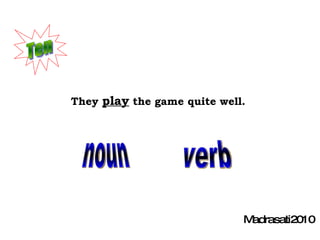

While most proper nouns are singular, there are exceptions such as the United States and the Joneses. In the sentence, the words Iron Man is a proper noun because it names a specific type of suit. In written English, this type of nouns always begins with capital letters. It can also include real or fictional characters as well as settings. Proper NounĪ proper noun names a specific individual, events, or places. What are the Types of Nouns and Examples 1. Examples of such words include mouse and mice, person and people, tooth and teeth, among others. However, not all nouns follow this regular pattern. For instance, the plural form of a cup is cups, and class is classes. You only need to add the letter "s" or "es" at the end of a singular noun to convert it to a plural form. In singular form, the noun refers to one thing, while the plural form refers to more than one thing. In this example, the verb running acts as a noun, and it's the subject of the sentence.

Phrases and other parts of speech can also behave like a noun in a sentence. In this definition, the term "thing" could refer to inanimate objects, ideas, abstract concepts, and activities. What is a Noun?Ī noun is a person, place, or thing. We'll also consider the various ways to use this word class in sentences and how you can benefit from using INK Noun Checker. That's because it relies on a super vague term such as "thing" to describe this word class.Īlong with defining the non-specific term, "thing," this post explores the types of nouns, including examples. Modern linguists, however, believe that this traditional definition of nouns is overly simplified. People's understanding of nouns have been based on this definition. INK Noun checker can help identify nouns in a sentence.īasically, nouns are words that refer to people, places, or things.You can use noun in a sentence as a subject, object, subject-object complement, or appositive.Pronouns and gerunds are not nouns, but they can act as nouns.The types of noun include proper, common, abstract, concrete, countable, non-countable, collective, and compound nouns.A noun is a word that refers to a person, place, idea, concept, and activities.
#NODEBOX CONVERT VERB TO NOUN SERIES#
The articles in this series define and exemplify the most common word formation processes, or the creation of new words, in English including derivation, back-formation, conversion, compounding, clipping, blending, abbreviations, acronyms, eponyms, coinages, nonce words, borrowing, and calquing.INK Noun Checker tool can help identify the nouns in your writings. This post is part of the series: Word Formation: Creating New Words in English

interjection to noun: ho ho ho → I love the ho ho hos of Christmastime.conjunction to noun: if, and, but → no ifs, ands, or buts.preposition to noun: up, down → the ups and downs of life.adjective to verb: green → to green (to make environmentally friendly).Other ConversionsĬonversion also occurs, although less frequently, to and from other grammatical forms. Verb to noun conversion is also referred to as nominalization. We need to increase (verb) our productivity to see an increase (noun) in profits.Sometimes one just needs a good cry (noun).The enemy attacked (verb) before an alert (noun) could be sounded.The guard alerted (verb) the general to the attack (noun).The following list provides examples of nouns converted from verbs: Verb to Noun ConversionĪnother productive form of conversion in English is verb to noun conversion. Noun to verb conversion is also referred to as verbification or verbing, as humorously discussed by Calvin and Hobbes. The doctor eyed (verb) my swollen eye (noun).She heated her lunch in the microwave (noun).My grandmother put the juice in a bottle (noun) and the pickles in a can (noun).My grandmother bottled (verb) the juice and canned (verb) the pickles.The following list provides examples of verbs converted from nouns: The most productive form of conversion in English is noun to verb conversion. However, many linguistics argue for a clear distinction between the word formation processes of derivation and conversion. Conversion is also referred to as zero derivation or null derivation with the assumption that the formal change between words results in the addition of an invisible morpheme. The original noun email experienced conversion, thus resulting in the new verb email. For example, the noun email appeared in English before the verb: a decade ago I would have sent you an email (noun) whereas now I can either send you an email (noun) or simply email (verb) you. Conversion is the word formation process in which a word of one grammatical form becomes a word of another grammatical form withoutĪny changes to spelling or pronunciation.


 0 kommentar(er)
0 kommentar(er)
